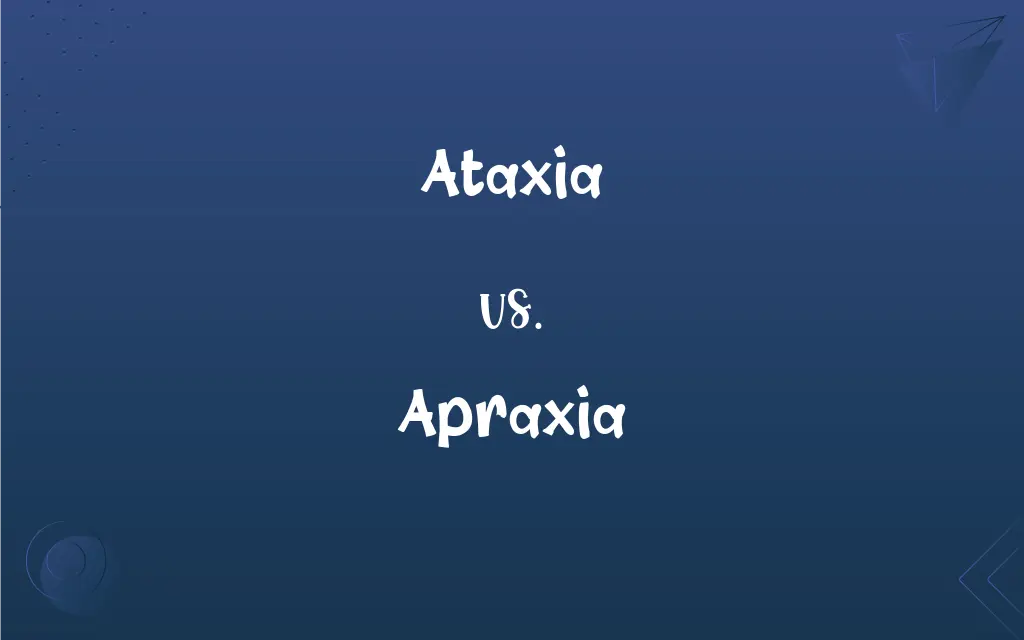Ataxia vs. Apraxia: What's the Difference?
Edited by Aimie Carlson || By Janet White || Published on February 8, 2024
Ataxia is a lack of muscle coordination during voluntary movements, while apraxia is the inability to perform learned movements, despite having the desire and physical capacity.

Key Differences
Ataxia is a neurological sign manifesting as a lack of coordination in muscle movements, often making tasks like walking or picking up objects difficult. Apraxia, on the other hand, is a motor disorder where an individual struggles to perform tasks or movements when asked, despite understanding the request and having the physical ability to do so.
Ataxia often results from dysfunction in the cerebellum, the part of the brain that controls coordination. In contrast, apraxia typically arises from impairments in the cerebral cortex, particularly areas responsible for motor planning.
Individuals with ataxia may exhibit unsteady gait, slurred speech, and difficulty with fine motor tasks. Conversely, those with apraxia may find it challenging to carry out complex motor activities, such as dressing or mimicking hand gestures, even though they conceptually understand how to do them.
Ataxia can be a symptom of various conditions, including stroke, multiple sclerosis, or genetic disorders. In contrast, apraxia often occurs following brain injury, stroke, or neurodegenerative diseases, affecting an individual's ability to execute learned movements.
Treatment for ataxia focuses on addressing the underlying cause and physical therapy to improve coordination. Treatment for apraxia involves occupational and speech therapy to relearn lost or impaired motor skills.
ADVERTISEMENT
Comparison Chart
Primary Issue
Lack of muscle coordination
Inability to perform learned movements
Typical Causes
Cerebellar dysfunction
Cerebral cortex damage
Common Symptoms
Unsteady gait, slurred speech
Difficulty in executing complex tasks
Associated Conditions
Stroke, genetic disorders
Brain injury, neurodegenerative diseases
Treatment Focus
Improving coordination
Relearning motor skills
ADVERTISEMENT
Ataxia and Apraxia Definitions
Ataxia
Ataxia is a neurological condition characterized by impaired coordination of voluntary movements.
A person with ataxia might stumble frequently due to uncoordinated walking.
Apraxia
It involves difficulty in coordinating the sequence of movements, despite having the desire and physical ability.
He has apraxia, which makes complex tasks like using utensils challenging.
Ataxia
Ataxia results from dysfunction in the cerebellum or nervous system.
After a stroke affecting her cerebellum, she developed ataxia, making her movements clumsy.
Apraxia
Apraxia can occur as a result of stroke, brain injury, or neurodegenerative diseases.
Post-stroke, she faced apraxia, complicating her ability to cook independently.
Ataxia
Treatment for ataxia often involves physical therapy and addressing the root cause.
He underwent physical therapy to manage his ataxia symptoms after a diagnosis of multiple sclerosis.
Apraxia
Apraxia is a motor disorder characterized by the inability to execute learned movements.
Despite understanding the task, his apraxia made it hard to tie his shoelaces.
Ataxia
Ataxia can be a symptom of various neurological disorders.
Ataxia in her case was a sign of an underlying genetic neurological condition.
Apraxia
Apraxia arises from brain damage, particularly affecting the motor planning areas.
After her brain injury, she developed apraxia, struggling with daily activities like brushing her hair.
Ataxia
This condition manifests in poor balance, unsteady gait, and lack of precision in movements.
His ataxia was evident in his unsteady walk and difficulty in grasping objects.
Apraxia
Treatment for apraxia includes speech and occupational therapy.
To address his apraxia, he engaged in occupational therapy to relearn basic movements.
Ataxia
Loss of the ability to coordinate muscular movement.
Apraxia
Total or partial loss of the ability to perform coordinated movements or manipulate objects in the absence of motor or sensory impairment.
Ataxia
Any of various degenerative, often hereditary, disorders that are characterized by ataxia and are frequently associated with cerebellar atrophy.
Apraxia
(neurology) Total or partial loss of the ability to perform coordinated movements or manipulate objects in the absence of motor or sensory impairment; specifically, a disorder of motor planning.
Ataxia
(pathology) Lack of coordination while performing voluntary movements, which may appear to be clumsiness, inaccuracy, or instability.
Apraxia
Inability to make purposeful movements, but without paralysis or loss of sensory function.
Ataxia
(chemistry) The condition of a polymer in which the orientation of the subunits is random
Apraxia
Inability to make purposeful movements
Ataxia
(obsolete) Disorder; irregularity.
Ataxia
Disorder; irregularity.
Ataxia
Irregularity in disease, or in the functions.
Ataxia
Loss of coordination in the voluntary muscles, especially the limbs; an inability to coordinate voluntary muscle movements; it results in unsteady movements and a staggering gait. See also locomotor ataxia, an ataxia which occurs when attempting to perform coordinated muscular movements.
Ataxia
Inability to coordinate voluntary muscle movements; unsteady movements and staggering gait
FAQs
What are the main symptoms of apraxia?
Difficulty in performing learned movements and tasks.
Can ataxia be genetic?
Yes, some forms of ataxia are hereditary.
Is apraxia related to a lack of understanding?
No, it's a disconnect between understanding and execution.
How is apraxia diagnosed?
Through neurological assessments and observing task performance.
How common is apraxia after a stroke?
It's a relatively common consequence of stroke.
Can ataxia affect speech?
Yes, it can lead to slurred or uncoordinated speech.
Can children have apraxia?
Yes, children can have apraxia, often diagnosed as developmental apraxia.
What causes ataxia?
It's often caused by cerebellar dysfunction or nerve damage.
Are there treatments for ataxia?
Yes, including physical therapy and treating the underlying cause.
Are there medications for ataxia?
Medications can manage symptoms but not cure ataxia.
Does apraxia affect intellectual ability?
No, it doesn't impact cognitive abilities.
Can lifestyle changes help with ataxia?
Healthy lifestyle choices can support overall treatment.
Is apraxia a form of paralysis?
No, it's a motor planning issue, not paralysis.
Can ataxia affect all age groups?
Yes, ataxia can occur at any age.
Does ataxia get worse over time?
It can progress, depending on the underlying cause.
Is ataxia always permanent?
Not always; it depends on the cause and treatment effectiveness.
Can exercise improve ataxia symptoms?
Targeted exercises can help improve coordination and balance.
Is apraxia always a result of brain injury?
Most cases are, but there are other potential causes.
Are there different types of apraxia?
Yes, including limb-kinetic, ideomotor, and ideational apraxia.
Can apraxia impact speech?
Yes, apraxia can affect speech, known as apraxia of speech.
About Author
Written by
Janet WhiteJanet White has been an esteemed writer and blogger for Difference Wiki. Holding a Master's degree in Science and Medical Journalism from the prestigious Boston University, she has consistently demonstrated her expertise and passion for her field. When she's not immersed in her work, Janet relishes her time exercising, delving into a good book, and cherishing moments with friends and family.
Edited by
Aimie CarlsonAimie Carlson, holding a master's degree in English literature, is a fervent English language enthusiast. She lends her writing talents to Difference Wiki, a prominent website that specializes in comparisons, offering readers insightful analyses that both captivate and inform.







































































